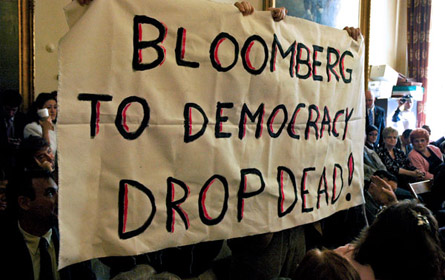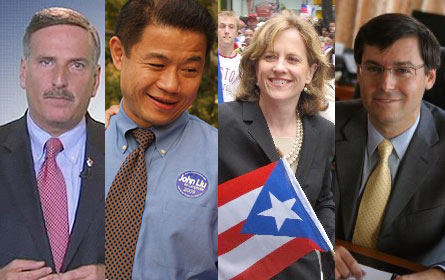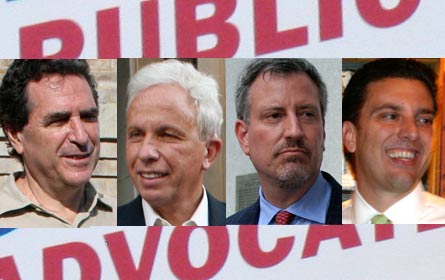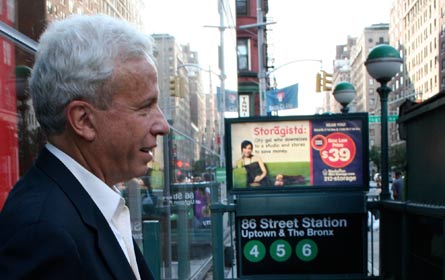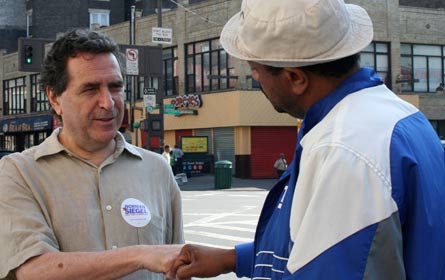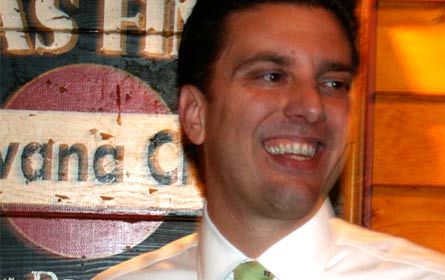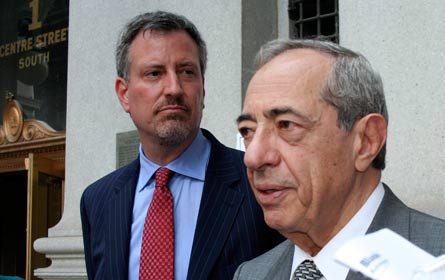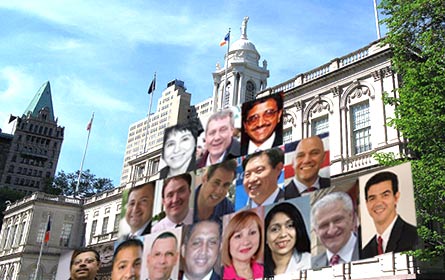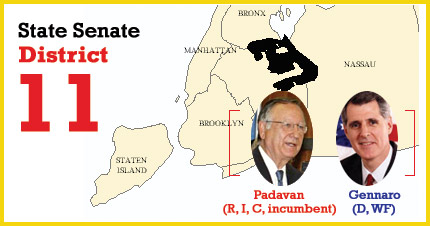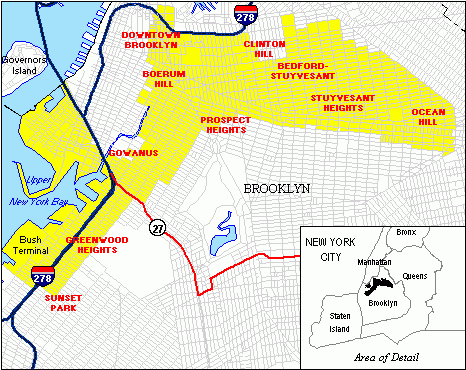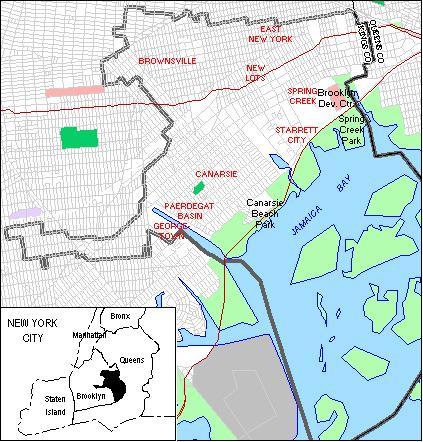
Gotham Gazette image by YH Huang
More than 30 residents whispered under their breath with agitation, glaring at the Police Athletic League representative at the front of the room. No butter knife could have cut through the annoyance whirling around St. Paul Apostle Church in Corona last week. A machete might have been more appropriate.
"Why do you have to close the street?" one resident shouted from the back of the room. A number of "yeahs" and "yays" followed. The chair of Community Board 4 hushed the crowd.
Most of the nearly three dozen residents were there to make sure 98th Place, a dead-end street with 28 parking spaces, would not be closed on weekdays this summer. The closure would make way for a free camp run by the Police Athletic League and funded with $50,000 from the City Council.
Here in Corona, where 40 percent of the population is on public assistance, parking is a priority.
"It's impossible to have one street closed," retorted Priscilla Carrow, the president of the Sherwood Village Tenants Association. "If you come to this neighborhood, you'll see people driving around for two hours looking for parking." The crowd cheered and applauded.
Minutes later, the community board defeated the street closure by a vote of 24 to 8 with three abstentions.
No one may be able to take the pulse of New York City's diverse communities better than the approximately 3,000 community board members, who put every street closure, pothole, sidewalk café application and alternate side parking sign under a microscope. Some call them "little City Halls," bridging the divide between elected officials and the residents they represent.
But that might not be for long.
According to numerous elected officials and community leaders, the Bloomberg administration would have considered restructuring community boards if the charter revision commission the mayor announced in January 2008 had actually been formed. Some, such as mayoral candidate and Councilmember Tony Avella, allege the administration was considering eliminating the boards altogether. A spokesperson for the administration denied both of these claims.
It now seems unlikely that any charter revision commission will be kicked off before this fall's mayoral election. But officials and community board members say the threat to their existence still looms -- in the present form of proposed budget cuts -- and their days (at least as they know them now) could very well be numbered.
What's In A Community Board?
Founded in 1975 as an evolution of Manhattan's planning councils, the city's 59 community boards are required by the city charter to serve as advisors to city agencies, City Council members and the administration and participate in the city's budget and land use processes. Each board can have as many as 50 members, all volunteers, who are appointed by the borough presidents.
In a nutshell, their job is to relay to city leaders what needs to be done in every community. Sometimes those leaders listen. Sometimes they do not.
Just outside of a Community Board 1 meeting in an industrial art space in Lower Manhattan earlier this month, Bob Townley, a member of the board for 20 years, explained. "Community boards are tremendously long-winded at times," Townley said. "They take on issues in not the most effective ways. They have petty self interest, but that's democracy."
Crucial to their role is the land use process. Every development or rezoning application will make its way through the community board, allowing residents of the community to engage with stakeholders. The boards' recommendations are not binding, but can influence the planning commission and the City Council.
The boards also act as hubs for service delivery. Every board has a staff, which includes a district manager. The community board staff is there to take complaints (similar to 311 and councilmember district offices) and make sure they are taken care of, from a pothole on Broadway to graffiti in Astoria.
Though they serve as advisors, the city charter makes it clear that a community board cannot direct or order any city agency to do anything -- a lot of bark with little bite.
"I think all community boards get input from the community," said Lou Walker, chair of Community Board 4 in Queens. "In all situations, even when (city officials) go against us, they do listen to what we have to say."
But are they necessary or just another instance of government redundancy at its best?
In January 2008, at his state of the city Mayor Michael Bloomberg announced he would appoint a charter revision commission to take a "top-to-bottom" look at the functioning of city government -- 20 years since the last charter revision commission that eliminated the Board of Estimate.
"We've come to see redundancies, antiquated regulations and areas for cost-savings. It's time to apply those lessons in order to make government more open, accountable, and efficient -- not just this year, but permanently," the mayor said.
More than a year later, a commission has not been formed (many think because of the term limits battle). But the thought of this commission and what could happen if the mayor is re-elected lingers in the minds of community activists and city officials.
When asked whether restructuring community boards was part of the administration's plans, mayoral spokesperson Marc LaVorgna said in an e-mailed statement: "The mayor has committed to another commission. There have been no discussions about the community boards and the commission. Any discussions of that nature that would bias the review process and defeat the entire purpose of a comprehensive review."
But in a community report from January, Manhattan Borough President Scott Stringer stated: "The mayor has promised to appoint a charter commission to look at a variety of issues around the city’s constitution. I have a particular concern that in the process we retain -- and increase -- the critical role played by community boards in the land use process."
Community officials and City Council members confirmed that community boards could be on the table if a charter revision commission is ever called.
"It's no secret that this administration would like to undermine community boards, " said Councilmember Alan Gerson of Manhattan. "At the very least, there are folks within the administration that would love to do away with community boards. … Just the fact that they would have that kind of (budget) cut, it's politically and financially motivated."
All Advising or Not?
Community Board 1 in the Bronx is inundated with what members say are the worst neighbors. Waste transfer stations, homeless shelters and halfway houses migrate to the board's streets. They are inundated with "transitional facilities," they say.
The latest was on St. Anne's Avenue. Without notification, a five-story apartment building was illegally converted into a halfway house, serving 52 men. Fights, said the board's District Manager Cedric Loftin, spilled onto the streets.
The house, he told about 30 community board members in the South Bronx earlier this month, was located across the street from a school.
With the local precinct's help, said Loftin, the facility would soon leave the premises.
"If the community board didn't have a relationship with the property owners and the home owners and the school," said board chair George Rodriguez, "we wouldn't have known (it was there)."
"We took the bull by the horns," Rodriguez adds, throwing his fists into the air.
To those like Rodriguez, community boards, though strictly advisory, can have an impact.
Take land use, for instance. Private developers start at the community level, say city officials, wheeling and dealing in the back rooms of community board offices with district leaders and interested residents on bulk, height and zoning.
"The teeth is that they have to come to us first," said Michael Levine, Manhattan Community Board 1's director of land use and planning. "We are the testing ground."
This consensus may be seen in the number of rezoning plans community boards have actually opposed at the end of the land use review process. Out of the 96 rezoning plans the Bloomberg administration has done, just five were voted down by community boards. About one in five were approved with recommendations, which were later considered by the planning commission and the City Council.
For example, rezonings for Homecrest and Midwood in Brooklyn, Corona in Queens, the East Village and Lower East Side in Manhattan all were modified by the city's planning commission to reflect the community board's recommendations.
Council members, like Land Use Committee Chair Melinda Katz, contend that they always look at the opinion of the community board. They may not always agree with it, but they do factor it into their decision on a project.
"We always look at their conditions," said Katz. "Since their responsibility is advisory, there is no reason to cut them from the process, unless you don't want to know," she added.
A Good Use of Resources?
Not everyone agrees that community boards are the best use of city resources. Some charge they are outdated, anti-development and stall the planning process.
According to a report by Stringer from 2005 while he ran for borough president, the community board selection process was riddled by politics, funding was distributed unevenly, and membership accountability was sporadic. Stringer has taken measures to deal with this in Manhattan, but, officials say, board efficiency and liability elsewhere still lag.
In East New York, about a dozen residents, some board members, stood on the sidewalk after their monthly community board meeting had been canceled for lack of a quorum. Those members of Brooklyn's Community Board 5 said their group left a lot to be desired.
"The appointments are very political," said Joy Simmons, who was at the meeting to represent Councilmember Charles Barron. "It's political machinery."
To others, those who are appointed don't have the best interest of the community in mind. Alice Lowman, who has been on the board for four years, says their meetings can be about "who's who."
"I honestly believe community board members should be elected," said Lowman. "You might get people who show commitment to the community."
These characteristics or frustrations vary from one board to another, from Manhattan to Queens to Staten Island. Even if the boards are ineffective, though, many members fear losing a venue for civic participation.
"It's not about efficiency," said Hope Cohen, a community board member who is deputy director of the Center for Rethinking Development at the Manhattan Institute. "It's about participation."
When the Going Gets Tough
In the 1990s, community boards lost their youth program coordinators. They never got them back.
This year boards across the city are bracing themselves for more staff cuts. For most city agencies, $1.1 million, while not irrelevant, might be less damaging. For community boards, with a total budget of $13.8 million, it means one person in all of the 59 boards will likely lose his or her job. Most community boards have a staff of three.
When the mayor first came to office, the community board budgets totaled $11.4 million. The cut this year, members and officials allege, is disproportionate to what other agencies have been handed.
"I think there is a feeling if we cut the community boards any more we're cutting our own nose," said Councilmember Jimmy Vacca, who was elected in 2005 after serving as a district manager for nearly 30 years. "These boards are 30 to 50 people that have a district manager and maybe two to three people in their office."
The proposed community board cut accounts for a nearly 8 percent of their budget. For comparison's sake, the city's Planning Department is getting a 9.3 percent decrease, while libraries are getting a 22 percent cut.
"The economic downturn has left the city with $5 billion less in revenue so we have to reduce expenses," said LaVorgna, the mayoral spokesperson, in an e-mailed statement. "From police and fire departments to education and social services, every entity receiving city tax dollars has had to cut expenses and find ways to be more efficient. The same holds true for the community boards."
Council members, community board members and district managers contend, however, that these cuts would cripple the boards. They argue that this is how the administration plans on doing away with their influence, sans charter revision commission. He will cut them to death, they cry.
"You never have to say we don't need community boards," said Stringer. "You just cut the budget... That's a way around getting rid of them."
Late last year, the City Council was able to successfully fight to prevent a cut to community boards. Now that the fiscal situation looks even more dire, it is questionable whether they will make community boards a priority.
Budget negotiations are ongoing at City Hall, and a rally is scheduled for this week to draw attention to the cut. The budget must be approved by the council by July 1.
Who Will Save the Boards?
In 1977, a 16-year-old resident of Washington Heights attended his first community board meeting as a member -- the youngest ever.
About 32 years later, he leaned back in his chair, thumbed through his Blackberry with his feet crossed on top of his desk and said he is ready to stand up for community board survival.
That teenager was Scott Stringer. His tenure as borough president has, in part, hinged on community board reform. Stringer started an application process for board members, who would then be reviewed by a coalition of nonprofit and planning groups.
He started giving graduate urban planning students the opportunity to work as planning consultants in Manhattan community board offices. He eliminated community board vacancies, which were rampant when he first took office. Instead of slashing boards, Stringer says, he would like to see the city adopt some of these policies citywide. While it is redundant to have boards participate in direct service, Stringer says, he hopes community boards' planning responsibilities can be strengthened.
Other city officials have their own proposals to strengthen boards. Councilmember David Yassky plans on introducing legislation in July that would require city agencies to assess what services could be impacted by major development projects. Agencies would have to report to the council member and the community board on how they would address those impacts.
Avella plans on introducing legislation that would strengthen the boards' master plans (otherwise known as 197-a plans), which are proposals on how to approach development in the district. Currently those master plans have no force of law.
A Neighborhood Meeting
At one meeting in the Bronx, an 80-year old resident and board member delivers a recipe for a special health tonic as the final remarks to Board 1's monthly meeting.
At another in Manhattan, members act as if their community board meeting is a social engagement, milling about the back of the room, circulating from one small group to the other, digesting the neighborhood's news.
In Brooklyn, members say they are ready to get more responsibility, maybe even veto power over the types of projects they can get in their community.
Community boards are different vehicles for different people. Politicians, like Stringer or Vacca, can get their start there. In other areas, they can't even get a quorum.
"I do worry that the community boards have a softer shell and are more vulnerable for extinction," said Stringer.
For now, we'll just call them endangered.
